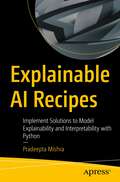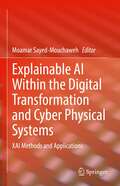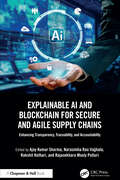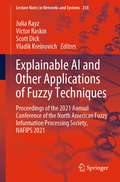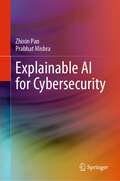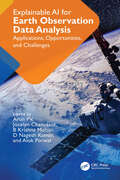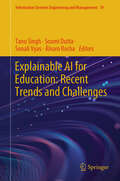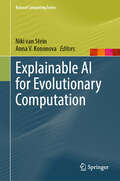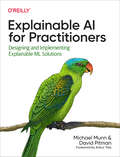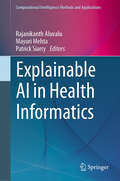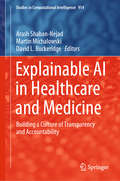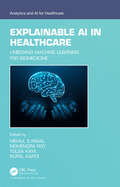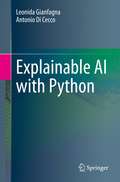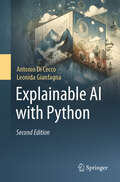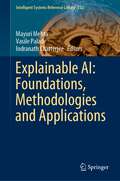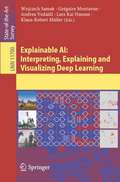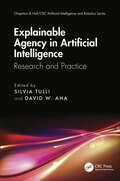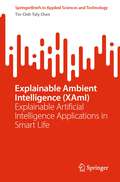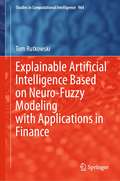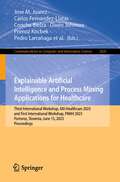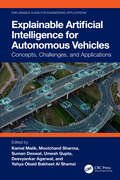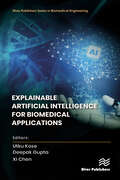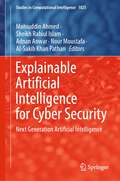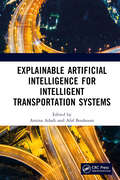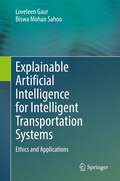- Table View
- List View
Explainable AI Recipes: Implement Solutions to Model Explainability and Interpretability with Python
by Pradeepta MishraUnderstand how to use Explainable AI (XAI) libraries and build trust in AI and machine learning models. This book utilizes a problem-solution approach to explaining machine learning models and their algorithms. The book starts with model interpretation for supervised learning linear models, which includes feature importance, partial dependency analysis, and influential data point analysis for both classification and regression models. Next, it explains supervised learning using non-linear models and state-of-the-art frameworks such as SHAP values/scores and LIME for local interpretation. Explainability for time series models is covered using LIME and SHAP, as are natural language processing-related tasks such as text classification, and sentiment analysis with ELI5, and ALIBI. The book concludes with complex model classification and regression-like neural networks and deep learning models using the CAPTUM framework that shows feature attribution, neuron attribution, and activation attribution. After reading this book, you will understand AI and machine learning models and be able to put that knowledge into practice to bring more accuracy and transparency to your analyses.What You Will LearnCreate code snippets and explain machine learning models using PythonLeverage deep learning models using the latest code with agile implementationsBuild, train, and explain neural network models designed to scaleUnderstand the different variants of neural network models Who This Book Is ForAI engineers, data scientists, and software developers interested in XAI
Explainable AI Within the Digital Transformation and Cyber Physical Systems: XAI Methods and Applications
by Moamar Sayed-MouchawehThis book presents Explainable Artificial Intelligence (XAI), which aims at producing explainable models that enable human users to understand and appropriately trust the obtained results. The authors discuss the challenges involved in making machine learning-based AI explainable. Firstly, that the explanations must be adapted to different stakeholders (end-users, policy makers, industries, utilities etc.) with different levels of technical knowledge (managers, engineers, technicians, etc.) in different application domains. Secondly, that it is important to develop an evaluation framework and standards in order to measure the effectiveness of the provided explanations at the human and the technical levels. This book gathers research contributions aiming at the development and/or the use of XAI techniques in order to address the aforementioned challenges in different applications such as healthcare, finance, cybersecurity, and document summarization. It allows highlighting the benefits and requirements of using explainable models in different application domains in order to provide guidance to readers to select the most adapted models to their specified problem and conditions.Includes recent developments of the use of Explainable Artificial Intelligence (XAI) in order to address the challenges of digital transition and cyber-physical systems;Provides a textual scientific description of the use of XAI in order to address the challenges of digital transition and cyber-physical systems;Presents examples and case studies in order to increase transparency and understanding of the methodological concepts.
Explainable AI and Blockchain for Secure and Agile Supply Chains: Enhancing Transparency, Traceability, and Accountability
by Narasimha Rao Vajjhala Rajasekhara Mouly Potluri Ajay Kumar Sharma Rakshit KothariThis book examines the transformative potential of integrating explainable artificial intelligence (XAI) and blockchain technology in modern supply chain management.It explores how these innovative technologies address pressing challenges such as data transparency, traceability, fraud prevention, and operational efficiency in complex global supply chains. With detailed analyses, case studies, and real-world applications, these chapters provide insights into leveraging XAI to demystify AI decision-making and blockchain, ensuring data security and decentralized accountability. Key topics include sustainable practices, smart contract automation, and human-centric approaches to enhancing trust and collaboration among stakeholders.This comprehensive volume serves as a valuable resource for academics, industry leaders, and policymakers seeking to harness cutting-edge technologies for building resilient and transparent supply chains.
Explainable AI and Other Applications of Fuzzy Techniques: Proceedings of the 2021 Annual Conference of the North American Fuzzy Information Processing Society, NAFIPS 2021 (Lecture Notes in Networks and Systems #258)
by Vladik Kreinovich Julia Rayz Victor Raskin Scott DickThis book focuses on an overview of the AI techniques, their foundations, their applications, and remaining challenges and open problems. Many artificial intelligence (AI) techniques do not explain their recommendations. Providing natural-language explanations for numerical AI recommendations is one of the main challenges of modern AI. To provide such explanations, a natural idea is to use techniques specifically designed to relate numerical recommendations and natural-language descriptions, namely fuzzy techniques. This book is of interest to practitioners who want to use fuzzy techniques to make AI applications explainable, to researchers who may want to extend the ideas from these papers to new application areas, and to graduate students who are interested in the state-of-the-art of fuzzy techniques and of explainable AI—in short, to anyone who is interested in problems involving fuzziness and AI in general.
Explainable AI for Cybersecurity
by Prabhat Mishra Zhixin PanThis book provides a comprehensive overview of security vulnerabilities and state-of-the-art countermeasures using explainable artificial intelligence (AI). Specifically, it describes how explainable AI can be effectively used for detection and mitigation of hardware vulnerabilities (e.g., hardware Trojans) as well as software attacks (e.g., malware and ransomware). It provides insights into the security threats towards machine learning models and presents effective countermeasures. It also explores hardware acceleration of explainable AI algorithms. The reader will be able to comprehend a complete picture of cybersecurity challenges and how to detect them using explainable AI. This book serves as a single source of reference for students, researchers, engineers, and practitioners for designing secure and trustworthy systems.
Explainable AI for Earth Observation Data Analysis: Applications, Opportunities, and Challenges
by Jocelyn Chanussot Arun Pv B Krishna Mohan D Nagesh Kumar Alok PorwalThe role of artificial intelligence is crucial in the domain of Earth Observation (EO) data analysis. Deep learning-based approaches have improved accuracy, but they have affected the reliability and transparency of EO data. It is critical to improve the explainability of EO data analysis algorithms and complex deep learning models to ensure the quality of spatial decisions. This book discusses the various advancements in Explainable AI and investigates their suitability for various EO data analyses offering best practices for implementing algorithms that facilitate big and efficient data processing. It lays the foundation of Explainable EO and helps readers build trustworthy, secure, and robust EO systems.Features: Examines explainability of algorithms from the aspect of generalizability and reliability. Reviews state-of-the-art explainability strategies related to the preprocessing algorithms. Provides explanations for specific evaluation metrics of various EO data processing and preprocessing algorithms. Discusses explainable ante-hoc and post-hoc approaches for EO data analysis. Serves as a foundational reference for developing future EO data processing strategies. Addresses the key challenges in making EO data processing algorithms interpretable and offers insights for the future of explainable EO data processing. This book is intended for graduate students, researchers and academics in computer and data science, machine learning, and image processing, as well as professionals in geospatial data science using GIS and remote sensing in Earth and environmental sciences.
Explainable AI for Education: Recent Trends and Challenges (Information Systems Engineering and Management #19)
by Álvaro Rocha Soumi Dutta Sonali Vyas Tanu Singh“Explainable AI for Education: Recent Trends and Challenges” is a comprehensive exploration of the intersection between artificial intelligence (AI) and education. In this book, we delve into the critical need for transparency and interpretability in AI systems deployed within educational contexts. Key Themes Understanding AI in Education: We provide a concise overview of AI techniques commonly used in educational settings, including recommendation systems, personalized learning, and assessment tools. Readers will gain insights into the potential benefits and risks associated with AI adoption in education. The Black-Box Problem: AI models often operate as “black boxes,” making it challenging to understand their decision-making processes. We discuss the implications of this opacity and emphasize the importance of explainability. Explainable AI (XAI) Techniques: From rule-based approaches to neural network interpretability, we explore various methods for making AI models more transparent. Examples and case studies illustrate how XAI can enhance educational outcomes. Ethical Considerations: As AI becomes more integrated into education, ethical dilemmas arise. We address issues related to bias, fairness, and accountability, emphasizing responsible AI practices. Future Directions: Our book looks ahead, considering the evolving landscape of AI and its impact on education. We propose research directions and practical steps to promote XAI adoption in educational institutions.
Explainable AI for Evolutionary Computation (Natural Computing Series)
by Anna V. Kononova Niki Van SteinThis book explores the intersection between explainable artificial intelligence (XAI) and evolutionary computation (EC). In recent years, the fields of XAI and EC have emerged as vital areas of study within the broader domain of artificial intelligence and computational intelligence. XAI seeks to address the pressing demand for transparency and interpretability in AI systems, enabling their decision-making processes to be scrutinised and trusted. Meanwhile, EC offers robust solutions to complex optimisation problems across diverse and challenging domains, drawing upon the principles of natural evolution. While each field has made significant contributions independently, their intersection remains an underexplored area rich with transformative potential. This book charts a path towards advancing computational systems that are transparent, reliable, and ethically sound. It aims to bridge the gap between XAI and EC by presenting a comprehensive exploration of methodologies, applications and case studies that highlight the synergies between these fields. This book will serve as both a resource and an inspiration, encouraging researchers and practitioners within XAI and EC, as well as those from adjacent disciplines, to collaborate and drive the development of intelligent computational systems that are not only powerful but also inherently trustworthy.
Explainable AI for Practitioners: Designing and Implementing Explainable ML Solutions
by Michael Munn David PitmanMost intermediate-level machine learning books focus on how to optimize models by increasing accuracy or decreasing prediction error. But this approach often overlooks the importance of understanding why and how your ML model makes the predictions that it does.Explainability methods provide an essential toolkit for better understanding model behavior, and this practical guide brings together best-in-class techniques for model explainability. Experienced machine learning engineers and data scientists will learn hands-on how these techniques work so that you'll be able to apply these tools more easily in your daily workflow.This essential book provides:A detailed look at some of the most useful and commonly used explainability techniques, highlighting pros and cons to help you choose the best tool for your needsTips and best practices for implementing these techniquesA guide to interacting with explainability and how to avoid common pitfallsThe knowledge you need to incorporate explainability in your ML workflow to help build more robust ML systemsAdvice about explainable AI techniques, including how to apply techniques to models that consume tabular, image, or text dataExample implementation code in Python using well-known explainability libraries for models built in Keras and TensorFlow 2.0, PyTorch, and HuggingFace
Explainable AI in Health Informatics (Computational Intelligence Methods and Applications)
by Patrick Siarry Mayuri Mehta Rajanikanth AluvaluThis book provides a comprehensive review of the latest research in the area of explainable artificial intelligence (XAI) in health informatics. It focuses on how explainable AI models can work together with humans to assist them in decision-making, leading to improved diagnosis and prognosis in healthcare. This book includes a collection of techniques and systems of XAI in health informatics and gives a wider perspective about the impact created by them. The book covers the different aspects, such as robotics, informatics, drugs, patients, etc., related to XAI in healthcare. The book is suitable for both beginners and advanced AI practitioners, including students, academicians, researchers, and industry professionals. It serves as an excellent reference for undergraduate and graduate-level courses on AI for medicine/healthcare or XAI for medicine/healthcare. Medical institutions can also utilize this book as reference material and provide tutorials to medical professionals on how the XAI techniques can contribute to trustworthy diagnosis and prediction of the diseases.
Explainable AI in Healthcare and Medicine: Building a Culture of Transparency and Accountability (Studies in Computational Intelligence #914)
by David L. Buckeridge Arash Shaban-Nejad Martin MichalowskiThis book highlights the latest advances in the application of artificial intelligence and data science in health care and medicine. Featuring selected papers from the 2020 Health Intelligence Workshop, held as part of the Association for the Advancement of Artificial Intelligence (AAAI) Annual Conference, it offers an overview of the issues, challenges, and opportunities in the field, along with the latest research findings. Discussing a wide range of practical applications, it makes the emerging topics of digital health and explainable AI in health care and medicine accessible to a broad readership. The availability of explainable and interpretable models is a first step toward building a culture of transparency and accountability in health care. As such, this book provides information for scientists, researchers, students, industry professionals, public health agencies, and NGOs interested in the theory and practice of computational models of public and personalized health intelligence.
Explainable AI in Healthcare: Unboxing Machine Learning for Biomedicine (Analytics and AI for Healthcare)
by Mehul S Raval Mohendra Roy Tolga Kaya Rupal KapdiThis book combines technology and the medical domain. It covers advances in computer vision (CV) and machine learning (ML) that facilitate automation in diagnostics and therapeutic and preventive health care. The special focus on eXplainable Artificial Intelligence (XAI) uncovers the black box of ML and bridges the semantic gap between the technologists and the medical fraternity. Explainable AI in Healthcare: Unboxing Machine Learning for Biomedicine intends to be a premier reference for practitioners, researchers, and students at basic, intermediary levels and expert levels in computer science, electronics and communications, information technology, instrumentation and control, and electrical engineering. This book will benefit readers in the following ways: Explores state of art in computer vision and deep learning in tandem to develop autonomous or semi-autonomous algorithms for diagnosis in health care Investigates bridges between computer scientists and physicians being built with XAI Focuses on how data analysis provides the rationale to deal with the challenges of healthcare and making decision-making more transparent Initiates discussions on human-AI relationships in health care Unites learning for privacy preservation in health care
Explainable AI with Python
by Leonida Gianfagna Antonio Di CeccoThis book provides a full presentation of the current concepts and available techniques to make “machine learning” systems more explainable. The approaches presented can be applied to almost all the current “machine learning” models: linear and logistic regression, deep learning neural networks, natural language processing and image recognition, among the others.Progress in Machine Learning is increasing the use of artificial agents to perform critical tasks previously handled by humans (healthcare, legal and finance, among others). While the principles that guide the design of these agents are understood, most of the current deep-learning models are "opaque" to human understanding. Explainable AI with Python fills the current gap in literature on this emerging topic by taking both a theoretical and a practical perspective, making the reader quickly capable of working with tools and code for Explainable AI.Beginning with examples of what Explainable AI (XAI) is and why it is needed in the field, the book details different approaches to XAI depending on specific context and need. Hands-on work on interpretable models with specific examples leveraging Python are then presented, showing how intrinsic interpretable models can be interpreted and how to produce “human understandable” explanations. Model-agnostic methods for XAI are shown to produce explanations without relying on ML models internals that are “opaque.” Using examples from Computer Vision, the authors then look at explainable models for Deep Learning and prospective methods for the future. Taking a practical perspective, the authors demonstrate how to effectively use ML and XAI in science. The final chapter explains Adversarial Machine Learning and how to do XAI with adversarial examples.
Explainable AI with Python
by Leonida Gianfagna Antonio Di CeccoThis comprehensive book on Explainable Artificial Intelligence has been updated and expanded to reflect the latest advancements in the field of XAI, enriching the existing literature with new research, case studies, and practical techniques. The Second Edition expands on its predecessor by addressing advancements in AI, including large language models and multimodal systems that integrate text, visual, auditory, and sensor data. It emphasizes making complex systems interpretable without sacrificing performance and provides an enhanced focus on additive models for improved interpretability. Balancing technical rigor with accessibility, the book combines theory and practical application to equip readers with the skills needed to apply explainable AI (XAI) methods effectively in real-world contexts. Features: Expansion of the "Intrinsic Explainable Models" chapter to delve deeper into generalized additive models and other intrinsic techniques, enriching the chapter with new examples and use cases for a better understanding of intrinsic XAI models. Further details in "Model-Agnostic Methods for XAI" focused on how explanations differ between the training set and the test set, including a new model to illustrate these differences more clearly and effectively. New section in "Making Science with Machine Learning and XAI" presenting a visual approach to learning the basic functions in XAI, making the concept more accessible to readers through an interactive and engaging interface. Revision in "Adversarial Machine Learning and Explainability" that includes a code review to enhance understanding and effectiveness of the concepts discussed, ensuring that code examples are up-to-date and optimized for current best prac
Explainable AI: Foundations, Methodologies and Applications (Intelligent Systems Reference Library #232)
by Vasile Palade Mayuri Mehta Indranath ChatterjeeThis book presents an overview and several applications of explainable artificial intelligence (XAI). It covers different aspects related to explainable artificial intelligence, such as the need to make the AI models interpretable, how black box machine/deep learning models can be understood using various XAI methods, different evaluation metrics for XAI, human-centered explainable AI, and applications of explainable AI in health care, security surveillance, transportation, among other areas.The book is suitable for students and academics aiming to build up their background on explainable AI and can guide them in making machine/deep learning models more transparent. The book can be used as a reference book for teaching a graduate course on artificial intelligence, applied machine learning, or neural networks. Researchers working in the area of AI can use this book to discover the recent developments in XAI. Besides its use in academia, this book could be used by practitioners in AI industries, healthcare industries, medicine, autonomous vehicles, and security surveillance, who would like to develop AI techniques and applications with explanations.
Explainable AI: Interpreting, Explaining and Visualizing Deep Learning (Lecture Notes in Computer Science #11700)
by Klaus-Robert Müller Grégoire Montavon Wojciech Samek Andrea Vedaldi Lars Kai HansenThe development of “intelligent” systems that can take decisions and perform autonomously might lead to faster and more consistent decisions. A limiting factor for a broader adoption of AI technology is the inherent risks that come with giving up human control and oversight to “intelligent” machines. For sensitive tasks involving critical infrastructures and affecting human well-being or health, it is crucial to limit the possibility of improper, non-robust and unsafe decisions and actions. Before deploying an AI system, we see a strong need to validate its behavior, and thus establish guarantees that it will continue to perform as expected when deployed in a real-world environment. In pursuit of that objective, ways for humans to verify the agreement between the AI decision structure and their own ground-truth knowledge have been explored. Explainable AI (XAI) has developed as a subfield of AI, focused on exposing complex AI models to humans in a systematic and interpretable manner. The 22 chapters included in this book provide a timely snapshot of algorithms, theory, and applications of interpretable and explainable AI and AI techniques that have been proposed recently reflecting the current discourse in this field and providing directions of future development. The book is organized in six parts: towards AI transparency; methods for interpreting AI systems; explaining the decisions of AI systems; evaluating interpretability and explanations; applications of explainable AI; and software for explainable AI.
Explainable Agency in Artificial Intelligence: Research and Practice (Chapman & Hall/CRC Artificial Intelligence and Robotics Series)
by David W. Aha Silvia TulliThis book focuses on a subtopic of explainable AI (XAI) called explainable agency (EA), which involves producing records of decisions made during an agent’s reasoning, summarizing its behavior in human-accessible terms, and providing answers to questions about specific choices and the reasons for them. We distinguish explainable agency from interpretable machine learning (IML), another branch of XAI that focuses on providing insight (typically, for an ML expert) concerning a learned model and its decisions. In contrast, explainable agency typically involves a broader set of AI-enabled techniques, systems, and stakeholders (e.g., end users), where the explanations provided by EA agents are best evaluated in the context of human subject studies. The chapters of this book explore the concept of endowing intelligent agents with explainable agency, which is crucial for agents to be trusted by humans in critical domains such as finance, self-driving vehicles, and military operations. This book presents the work of researchers from a variety of perspectives and describes challenges, recent research results, lessons learned from applications, and recommendations for future research directions in EA. The historical perspectives of explainable agency and the importance of interactivity in explainable systems are also discussed. Ultimately, this book aims to contribute to the successful partnership between humans and AI systems. Features: • Contributes to the topic of explainable artificial intelligence (XAI) • Focuses on the XAI subtopic of explainable agency • Includes an introductory chapter, a survey, and five other original contributions
Explainable Ambient Intelligence: Explainable Artificial Intelligence Applications in Smart Life (SpringerBriefs in Applied Sciences and Technology)
by Tin-Chih Toly ChenThis book systematically reviews the progress of Explainable Ambient Intelligence (XAmI) and introduces its methods, tools, and applications. Ambient intelligence (AmI) is a vision in which an environment supports the people inhabiting it in an unobtrusive, interconnected, adaptable, dynamic, embedded, and intelligent way. So far, artificial intelligence (AI) technologies have been widely applied in AmI. However, some advanced AI methods are not easy to understand or communicate, especially for users with insufficient background knowledge of AI, which undoubtedly limits the practicability of these methods. To address this issue, explainable AI (XAI) has been considered a viable strategy. Although XAI technologies and tools applied in other fields can also be applied to explain AI technology applications in AmI, users should be the main body in the application of AmI, which is slightly different from the application of AI technologies in other fields. This book containsreal case studies of the application of XAml and is a valuable resource for students and researchers.
Explainable Artificial Intelligence Based on Neuro-Fuzzy Modeling with Applications in Finance (Studies in Computational Intelligence #964)
by Tom RutkowskiThe book proposes techniques, with an emphasis on the financial sector, which will make recommendation systems both accurate and explainable. The vast majority of AI models work like black box models. However, in many applications, e.g., medical diagnosis or venture capital investment recommendations, it is essential to explain the rationale behind AI systems decisions or recommendations. Therefore, the development of artificial intelligence cannot ignore the need for interpretable, transparent, and explainable models. First, the main idea of the explainable recommenders is outlined within the background of neuro-fuzzy systems. In turn, various novel recommenders are proposed, each characterized by achieving high accuracy with a reasonable number of interpretable fuzzy rules. The main part of the book is devoted to a very challenging problem of stock market recommendations. An original concept of the explainable recommender, based on patterns from previous transactions, is developed; it recommends stocks that fit the strategy of investors, and its recommendations are explainable for investment advisers.
Explainable Artificial Intelligence and Process Mining Applications for Healthcare: Third International Workshop, XAI-Healthcare 2023, and First International Workshop, PM4H 2023, Portoroz, Slovenia, June 15, 2023, Proceedings (Communications in Computer and Information Science #2020)
by Pedro Larrañaga Concha Bielza Alfredo Vellido Jorge Munoz-Gama Jose M. Juarez Carlos Fernandez-Llatas Owen Johnson Primoz Kocbek Niels Martin Gregor Štiglic Marcos SepulvedaThis book constitutes the proceedings of the Third International Workshop on Explainable Artificial Intelligence in Healthcare, XAI-Healthcare 2023, and the First International Workshop on Process Mining Applications for Healthcare, PM4H 2023, which took place in conjunction with AIME 2023 in Portoroz, Slovenia, on June 15, 2023.The 7 full papers included from XAI-Healthcare were carefully reviewed and selected from 11 submissions. They focus on all aspects of eXplainable Artificial Intelligence (XAI) in the medical and healthcare field. For PM4H 5 papers have been accepted from 17 submissions. They deal with data-driven process analysis techniques in healthcare.
Explainable Artificial Intelligence for Autonomous Vehicles: Concepts, Challenges, and Applications (Explainable AI (XAI) for Engineering Applications)
by Umesh Gupta Moolchand Sharma Deevyankar Agarwal Kamal Malik Suman Deswal Yahya Obaid Bakheet Al ShamsiExplainable AI for Autonomous Vehicles: Concepts, Challenges, and Applications is a comprehensive guide to developing and applying explainable artificial intelligence (XAI) in the context of autonomous vehicles. It begins with an introduction to XAI and its importance in developing autonomous vehicles. It also provides an overview of the challenges and limitations of traditional black-box AI models and how XAI can help address these challenges by providing transparency and interpretability in the decision-making process of autonomous vehicles. The book then covers the state-of-the-art techniques and methods for XAI in autonomous vehicles, including model-agnostic approaches, post-hoc explanations, and local and global interpretability techniques. It also discusses the challenges and applications of XAI in autonomous vehicles, such as enhancing safety and reliability, improving user trust and acceptance, and enhancing overall system performance. Ethical and social considerations are also addressed in the book, such as the impact of XAI on user privacy and autonomy and the potential for bias and discrimination in XAI-based systems. Furthermore, the book provides insights into future directions and emerging trends in XAI for autonomous vehicles, such as integrating XAI with other advanced technologies like machine learning and blockchain and the potential for XAI to enable new applications and services in the autonomous vehicle industry. Overall, the book aims to provide a comprehensive understanding of XAI and its applications in autonomous vehicles to help readers develop effective XAI solutions that can enhance autonomous vehicle systems' safety, reliability, and performance while improving user trust and acceptance.This book: Discusses authentication mechanisms for camera access, encryption protocols for data protection, and access control measures for camera systems. Showcases challenges such as integration with existing systems, privacy, and security concerns while implementing explainable artificial intelligence in autonomous vehicles. Covers explainable artificial intelligence for resource management, optimization, adaptive control, and decision-making. Explains important topics such as vehicle-to-vehicle (V2V) communication, vehicle-to-infrastructure (V2I) communication, remote monitoring, and control. Emphasizes enhancing safety, reliability, overall system performance, and improving user trust in autonomous vehicles. The book is intended to provide researchers, engineers, and practitioners with a comprehensive understanding of XAI's key concepts, challenges, and applications in the context of autonomous vehicles. It is primarily written for senior undergraduate, graduate students, and academic researchers in the fields of electrical engineering, electronics and communication engineering, computer science and engineering, information technology, and automotive engineering.
Explainable Artificial Intelligence for Biomedical Applications (River Publishers Series in Biomedical Engineering)
by Xi Chen Deepak Gupta Utku KoseSince its first appearance, artificial intelligence has been ensuring revolutionary outcomes in the context of real-world problems. At this point, it has strong relations with biomedical and today’s intelligent systems compete with human capabilities in medical tasks. However, advanced use of artificial intelligence causes intelligent systems to be black-box. That situation is not good for building trustworthy intelligent systems in medical applications. For a remarkable amount of time, researchers have tried to solve the black-box issue by using modular additions, which have led to the rise of the term: interpretable artificial intelligence. As the literature matured (as a result of, in particular, deep learning), that term transformed into explainable artificial intelligence (XAI). This book provides an essential edited work regarding the latest advancements in explainable artificial intelligence (XAI) for biomedical applications. It includes not only introductive perspectives but also applied touches and discussions regarding critical problems as well as future insights. Topics discussed in the book include: XAI for the applications with medical images XAI use cases for alternative medical data/task Different XAI methods for biomedical applications Reviews for the XAI research for critical biomedical problems. Explainable Artificial Intelligence for Biomedical Applications is ideal for academicians, researchers, students, engineers, and experts from the fields of computer science, biomedical, medical, and health sciences. It also welcomes all readers of different fields to be informed about use cases of XAI in black-box artificial intelligence. In this sense, the book can be used for both teaching and reference source purposes.
Explainable Artificial Intelligence for Cyber Security: Next Generation Artificial Intelligence (Studies in Computational Intelligence #1025)
by Al-Sakib Khan Pathan Mohiuddin Ahmed Nour Moustafa Sheikh Rabiul Islam Adnan AnwarThis book presents that explainable artificial intelligence (XAI) is going to replace the traditional artificial, machine learning, deep learning algorithms which work as a black box as of today. To understand the algorithms better and interpret the complex networks of these algorithms, XAI plays a vital role. In last few decades, we have embraced AI in our daily life to solve a plethora of problems, one of the notable problems is cyber security. In coming years, the traditional AI algorithms are not able to address the zero-day cyber attacks, and hence, to capitalize on the AI algorithms, it is absolutely important to focus more on XAI. Hence, this book serves as an excellent reference for those who are working in cyber security and artificial intelligence.
Explainable Artificial Intelligence for Intelligent Transportation Systems
by Amina Adadi Afaf BouhouteArtificial Intelligence (AI) and Machine Learning (ML) are set to revolutionize all industries, and the Intelligent Transportation Systems (ITS) field is no exception. While ML, especially deep learning models, achieve great performance in terms of accuracy, the outcomes provided are not amenable to human scrutiny and can hardly be explained. This can be very problematic, especially for systems of a safety-critical nature such as transportation systems. Explainable AI (XAI) methods have been proposed to tackle this issue by producing human interpretable representations of machine learning models while maintaining performance. These methods hold the potential to increase public acceptance and trust in AI-based ITS. FEATURES: Provides the necessary background for newcomers to the field (both academics and interested practitioners) Presents a timely snapshot of explainable and interpretable models in ITS applications Discusses ethical, societal, and legal implications of adopting XAI in the context of ITS Identifies future research directions and open problems
Explainable Artificial Intelligence for Intelligent Transportation Systems: Ethics and Applications
by Loveleen Gaur Biswa Mohan SahooTransportation typically entails crucial “life-death” choices, delegating crucial decisions to an AI algorithm without any explanation poses a serious threat. Hence, explainability and responsible AI is crucial in the context of intelligent transportation. In Intelligence Transportation System (ITS) implementations such as traffic management systems and autonomous driving applications, AI-based control mechanisms are gaining prominence.Explainable artificial intelligence for intelligent transportation system tackling certain challenges in the field of autonomous vehicle, traffic management system, data integration and analytics and monitor the surrounding environment.The book discusses and inform researchers on explainable Intelligent Transportation system. It also discusses prospective methods and techniques for enabling the interpretability of transportation systems. The book further focuses on ethical considerations apart from technical considerations.
